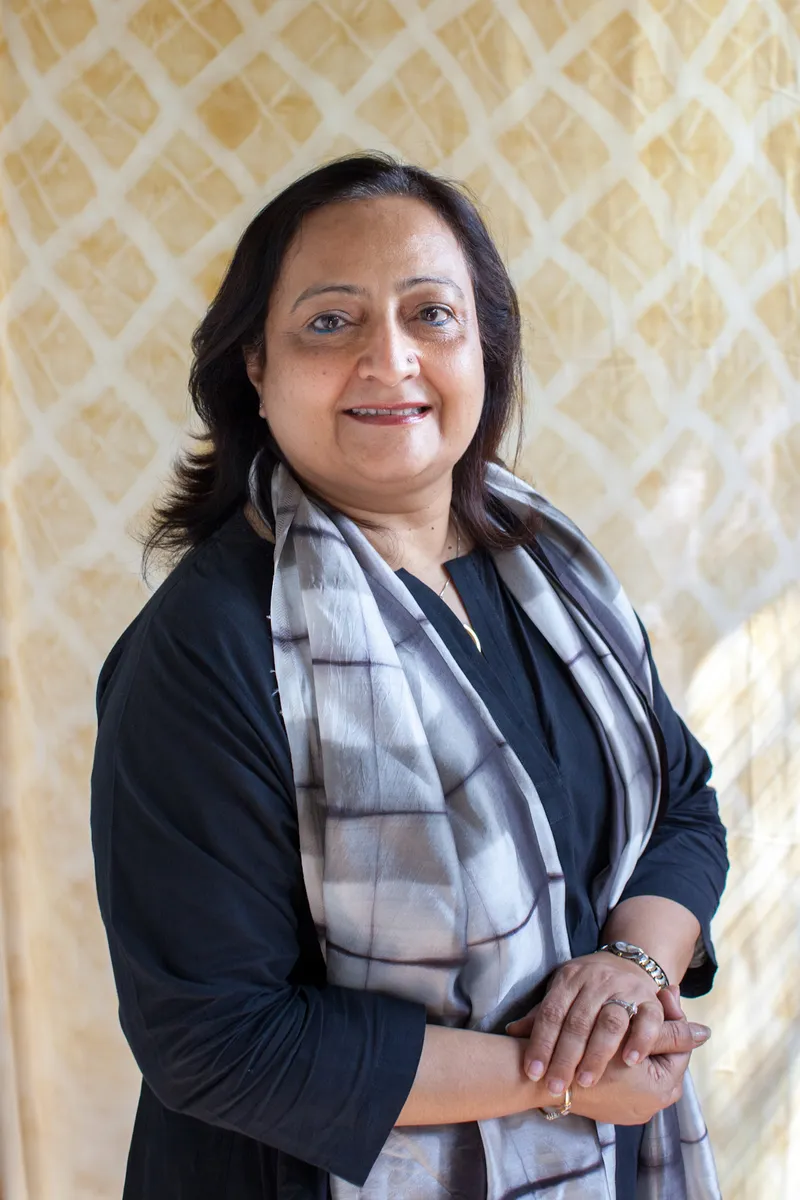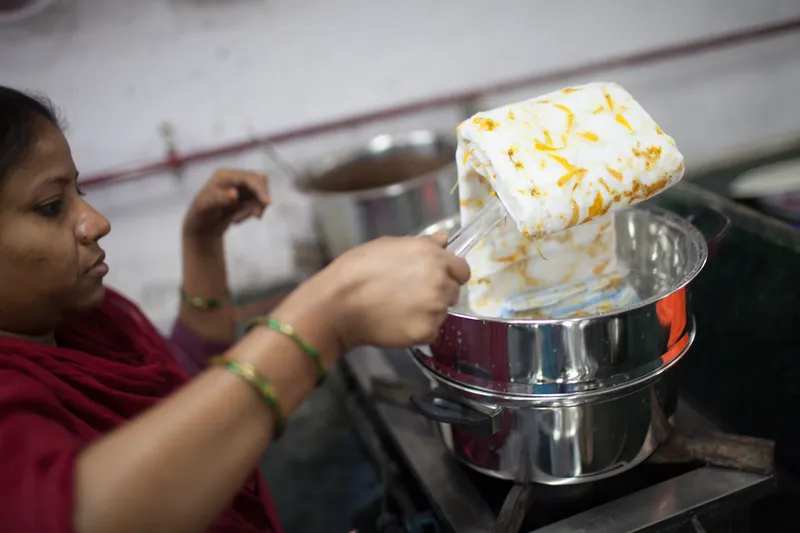This social enterprise uses discarded temple flowers to produce natural dyes
Rupa Trivedi, Founder of Adiv Pure Nature, makes natural, handmade dyes from discarded flowers to offer sustainable, artisanal natural-dye textiles, apparel, and lifestyle products.
Rupa Trivedi, Founder of Adiv Pure Nature, calls herself a non-traditional urban artisan.
The Mumbai-based entrepreneur started Adiv as a small experimental unit in 2006, which now manufactures and supplies sustainable, artisanal, hand, natural-dye textiles, apparel, and lifestyle products globally.

Rupa Trivedi
Trivedi was content managing an engineering business she started with her husband in 1981 until 2005-06, when her daughter got married, and the thought of taking a new direction in life filled her days.
She wanted to do something with nature and began visiting exhibitions that offered her glimpses into grassroots-level artists.
“They were so rural and beautiful in their representation of their art. I thought the first best stop to work with art would be to work with these artisans who are the truest representatives of nature. That’s how my journey with artisans began,” she tells SocialStory.
True colours
Trivedi explored and tried to understand different forms of art—basket weaving and blending essential oils. She also met weavers from Kutch to understand how they worked with fabric. All this helped her to consolidate her thoughts better.
Along this discovery path, she also met Maneka Gandhi (former minister and environmentalist) who introduced her to Eri silk (or Ahimsa silk). She also connected her to different weavers working with traditional fabrics.
“I now knew I wanted to work with natural fabric. And the best way to do it was with natural dyes. I started speaking with weavers and experimenting,” she says.
Adiv took root with Trivedi and an intern from Nirmala Niketan, a Mumbai-based college, where Trivedi learnt the process of natural dyeing. Armed with this knowledge, she began a small sewing unit to understand the scope of traditional fabrics.
Soon, two young girls joined the unit during their college vacation, and the group started experimenting with natural dyes using regular madder or pomegranate peels. In 2008, as part of her research, Trivedi also struck upon marigold flowers as a natural dye.
As a Mumbaikar, Trivedi witnesses significant sea pollution every year as flowers are dumped following the city-wide Ganesh Chaturthi celebrations. Also, religious places generate flower waste every day.
“I approached the Siddhi Vinayak temple asking for discarded flowers, and they were very receptive. I signed an agreement under which they gave me the flowers and also space within the temple to clean them,” she says.
This initiative led to the Temple Dye Project and Temple Blessings Textiles in 2012 and continues to this day.
Today, Adiv collects around 1,000-2,000 kg of rose, marigold, hibiscus, and coconut husks every week from the Siddhi Vinayak Temple and the Haji Ali Dargah in Mumbai. It could peak at 4,000 kgs during festival seasons, which are sorted, cleaned, and used to make natural dyes.
Trivedi explains, “The cleaned flowers are brought to our studio in Andheri. We extract the dye straight from the flowers or they are pulverised into powder form to be used later. Each procedure gives a different kind of shade, and this varies according to the different stages of drying or dyeing.”
The startup also sources herbal Ayurvedic dyes like madder, indigo, and pomegranate peel from local suppliers.
Sustainability at all levels

The making of the Eco-Print Idli Steam Dye
The patterns and textures on the natural fabric are created in different ways—tying, steaming, block dyeing, and hybrids of these techniques. For example, the women use binder clips to create a small check texture or household brushes for splattering marks.
The team continued experimenting, sometimes using an idli steamer to steam the fabric with the flowers to understand its effect, which led to the Eco-Print Idli Steam Dye!
In an effort to save water, one of Adiv’s dyers, Mukhtar, created a process of pole-wrapping fabrics, where an entire fabric is dyed in just a litre of water. The technique is rooted in the traditional Japanese Arashii method, and Mukhtar’s innovation made it the one-litre pipe method, which conserved water in the process.
To date, Adiv has extracted 20-30 shades of different dyes.
Meanwhile, more women from nearby slums joined the project and started earning a decent income to support their families.
When Trivedi showcased Adiv’s work, the responses initially were "mediocre to absolutely cold.” Slowly, their work started getting recognised.
“It’s interesting because somewhere I think, whether we believe it or not, the blessings come from the flowers with positive vibes, and our work is getting these serene vibes to reach as many people as possible,” says Trivedi. She believes flowers offered with love have an element of warmth in them.
The company works on the business-to-business (B2B) model and offers naturally hand-dyed fabrics, customised garments, and home furnishing. The fabric is sourced from weavers across India and is dyed as per clients’ requirements.
Over the years, Adiv has partnered with top brands like Anthropologie, Eileen Fisher, Globus Switzerland, Dosa, ABC Home, Lannius, Free People, and Amba.
Trivedi says that Adiv is still run as a one-woman show and as a social enterprise to provide employment to women. She says there is a lot of demand for the fabrics but a lack of funds comes in the way of brand expansion.
She believes taking the business B2C would mean compromising on the ethical nature of the process, which is why she does not branch out to other cities to collect discarded flowers.
“I am now looking to see how I can bring someone on board and make it into a consolidated and better project. I am also looking to raise funding,” she adds.
Edited by Suman Singh







